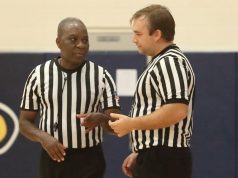Having both the ability and willingness to self-evaluate is
critical to becoming a better referee. Whether you do youth, school or amateur games, you must be able to critique yourself and be critiqued by others.
No matter how good you are in your profession (lawyer, police officer, office worker, etc.), you are not at the top of your officiating profession. You might be the best in your local area, but as you travel to youth competitions, college showcases or top tournaments, you are going to run into a speed of play and a level of intensity that is above your ability.
Being able to handle, and then get comfortable, at those new levels takes self-evaluation.
Look at yourself. Recognize your shortcomings. Understand what you could do better.
Overweight? Don’t study the rules enough? Quick temper? Too technical? Once you know what you need to work on, you can start to improve. Wanting to improve is a sign of having a good attitude. You must want to improve before you can improve.
In a past interview interview with Referee, NFL great Ed Hochuli said, “If you believe there is no room for improvement, get out of officiating because the next step is an obvious decline. That is embarrassing to you and your fellow officials. Every year, I am less content with my own abilities. I see so many great officials and I realize how many things I have
to work on.”
Officials tend to want to hear what they did wrong, but part of self-evaluation, just like part of a good assessment, is to know what you did right. What are your strengths? What do you do well? Foul recognition? Dealing with players? Protecting the superstar? Getting a team captain to help you with a troublesome player?
Tools
Personally, because it was always close and always there, I took notes on the back of my game-data sheets and about once a month would look for trends. At the end of the season, everything got reviewed for trends. Others use a low-tech spiral notebook, others might use an Excel spreadsheet and keep potential deficiencies right next to teams, age groups, score, what game of the day (fifth game of the day might be either fitness or concentration!), etc.
Not yet there?
There are going to be aspects of your game that you will want to improve. Read books, speak with a mentor and talk to an instructor or assessor. Get the tools you need. Then
practice. Then practice some more until muscle memory takes over. If you normally work youth games, try your new skills at lower age levels. If you normally work varsity contests, ask to be assigned to a few sub-varsity games to work on the new skill.
Rules
If rules knowledge is your downfall, there are dozens of on-line practice tests. If rules differences are a problem, studying the different rules books regularly is useful. The Referee Training Center has a wide variety of rules based publications in many sports including the official rulebooks and specialized titles available in print and digitally.
Mechanics
The best way to fix poor mechanics is through video. Seeing for yourself what others see will be the most effective feedback. From then on, a mirror is your best friend. If you can get access to footage from games you’ve recently worked, that will help immensely. If you cannot, then plan to have someone record your your next game or match and start to keep record of your improvements.
Officiate who you are
If you are not a humorous person, leave that out of your arsenal, even if suggested by an
assessor or observer. If you lack an authoritative aspect to your personality, don’t try to play the bad-cop on the field. If you are the silent type, don’t try to become a salesman and talk players out of bad behavior. If you are faster than a speeding train, stay near play. If you have a wide array of facial features use the appropriate one to send your message to players and coaches.
Forcing any type of behavior that you don’t have naturally will come off as fake or ineffective most of the time. If you want to add something to your skill-set, then practicing in front of a mirror, then with friends or partners is wise. As with changes to your mechanics, trying new skills at lower levels is always advised.
Take time to look inside
No matter your level of officiating, when you’re working a full schedule you may not have time to spend contemplating the finer points of your officiating skills and personality. Find the time. When you have downtime, make a point to really think about the criticism you’ve received over the years. Even if you brushed it off before, was there a grain of truth there somewhere? Have you really been the type of partner you’d want on your crew if the roles were reversed? Over the years, have you spend as much time as you should have on the rules, mechanics and intangible skills that are fundamental to being a competent official?
These questions and many more are the type only you can answer for yourself and only if you take the time.
What's Your Call? Leave a Comment:
Note: This article is archival in nature. Rules, interpretations, mechanics, philosophies and other information may or may not be correct for the current year.
This article is the copyright of ©Referee Enterprises, Inc., and may not be republished in whole or in part online, in print or in any capacity without expressed written permission from Referee. The article is made available for educational use by individuals.
















